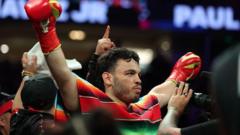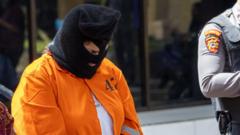Julio Cesar Chavez Jr's arrest by US immigration agents has raised eyebrows and initiated discussions around immigration policy, celebrity influence, and organized crime allegations.
Julio Cesar Chavez Jr Faces Deportation Over Allegations of Organized Crime

Julio Cesar Chavez Jr Faces Deportation Over Allegations of Organized Crime
Mexican Boxer’s Arrest Sparks Controversy Amid Immigration Raids
In a shocking incident on Thursday, US immigration authorities arrested Julio Cesar Chavez Jr, the 39-year-old Mexican boxing star, who is facing immediate deportation due to an active arrest warrant in Mexico tied to organized crime charges. Chavez Jr’s arrest came shortly after sharing a ring with YouTube star Jake Paul in California, where he sustained a defeat. According to US officials, Chavez has alleged connections with the Sinaloa drug cartel, a claim his lawyer vehemently denies.
The Department of Homeland Security (DHS), emphasizing the enforcement of immigration laws under the previous Trump administration, confirmed that Chavez Jr. is classified as "a prominent Mexican boxer and criminal illegal alien." Chavez Jr, son of the legendary boxer Julio Cesar Chavez Sr, was apprehended by ICE officers in Studio City, Los Angeles.
Reports indicate that Chavez Jr has faced past legal troubles in the US, including a January 2024 conviction for illegal possession of an assault weapon. Additionally, he is suspected of attempting to gain permanent US residency through fraudulent means, making misleading statements to immigration authorities and overstaying a tourist visa.
Amid the ICE crackdown on undocumented immigrants, Chavez Jr previously expressed his apprehension about the increasing raids, noting that members of the Latin community, including his trainer, were living in fear of deportation. His lawyer condemned the arrest as an attempt to intimidate the Latino community, asserting no substantive evidence links Chavez Jr to the organized crime allegations brought forward by immigration officials.
As this situation unfolds, it highlights the intersection of celebrity culture, immigration policy, and community fears, stirring debate around the implications of the US immigration enforcement strategy in light of high-profile figures like Chavez Jr.



















